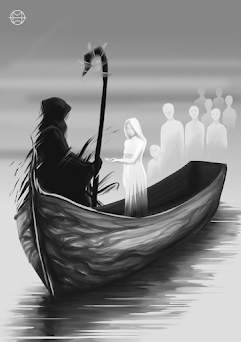LIFE AFTER LIFE
The human experience, in all its richness and complexity, is inevitably intertwined with the profound question of what lies beyond our mortal coil. The concept of the afterlife, encompassing various beliefs about the continuation of existence after physical death, has captivated and inspired humanity across cultures and throughout history. Today, we embark on a formal exploration of this multifaceted tapestry, weaving together diverse cultural perspectives on the afterlife.
Within the Abrahamic religions, namely Judaism, Christianity, and Islam, the concept of the afterlife often presents a stark dichotomy. The righteous are believed to be granted access to a heavenly realm characterized by eternal bliss and divine favor, while those deemed unworthy face punishment in a realm of suffering. This framework, emphasizing the consequences of one's actions in the earthly life, has significantly influenced the moral and ethical codes within these traditions.
In Hinduism, Buddhism, Sikhism, and Jainism, the concept of reincarnation takes center stage. The soul is believed to be immortal, undergoing a continuous cycle of rebirth based on the karmic principle of cause and effect. The ultimate goal within these Dharmic traditions is to achieve liberation (moksha) from this cycle of rebirth and attain a state of ultimate peace and freedom. This perspective emphasizes personal responsibility and the potential for spiritual growth through successive lifetimes.
Many indigenous cultures and African traditional religions hold the concept of ancestral spirits who continue to exist in a spirit world, maintaining a close connection with the living. Offerings and rituals are performed to honor and appease these ancestors, seeking their guidance, protection, and blessings. This belief system fosters a sense of community and continuity, emphasizing the enduring bonds between generations.
The ancient Egyptians developed an elaborate and fascinating belief system concerning the afterlife. They envisioned a journey to the Duat, the underworld, where the deceased would face judgment. If deemed worthy, they would join their ancestors in a blessed realm known as the "Field of Reeds," a fertile and abundant land mirroring their earthly homeland. This belief system offered comfort and solace, assuring the continuation of life beyond the physical world.
It is important to acknowledge that not all cultures subscribe to the concept of an afterlife. Certain ancient philosophies and some contemporary atheistic beliefs view death as the final cessation of existence, with no continuation of consciousness or awareness. This perspective emphasizes the importance of living a meaningful and fulfilling life in the present moment, as there is no promise of an existence beyond.
In conclusion, exploring the diverse cultural perspectives on the afterlife offers a window into the richness of human thought and the enduring quest to find meaning in the face of our mortality. While the ultimate truth remains veiled, understanding these diverse beliefs fosters empathy, appreciation, and a deeper understanding of the human experience in its magnificent complexity.


Comments
Post a Comment